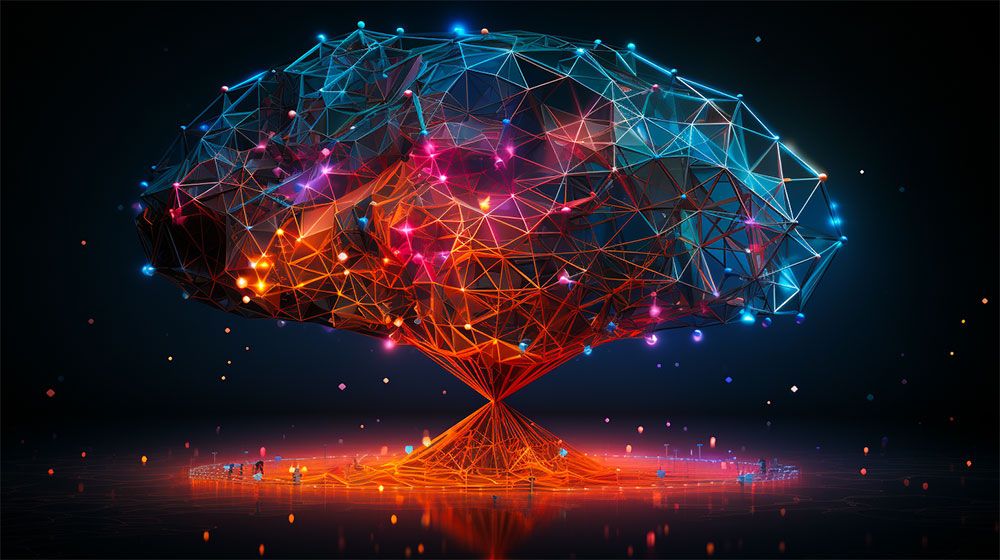Edge AI: Bridging Innovation, Privacy, and Real-Time Efficiency

In the hidden corners of our interconnected world, where the digital meets the tangible, a groundbreaking innovation quietly emerges: Edge AI. Unlike its predecessors, this ingenious technology does not rely on distant data centers or cloud servers; instead, it operates right at the edge of our devices, in the palm of our hands and at the heart of our homes. Imagine a future where intelligence is woven seamlessly into the fabric of our daily lives, where our devices not only respond swiftly but also respect the sanctity of our privacy. This is the captivating realm of Edge AI, a realm where innovation meets discretion, where speed meets security.
Definition of Edge AI and its Importance in the AI Landscape
At its core, Edge AI signifies a paradigm shift in the way we process information. Unlike traditional AI systems, which rely on centralised servers and cloud computing, Edge AI operates locally on devices, bringing the computational power closer to where the data is generated. This means your smartphones, smart home devices, and even industrial machines can make real-time decisions without constantly relying on a distant cloud server.
The significance of this lies in the immediacy it offers. Edge AI processes data swiftly, reducing latency and ensuring rapid responses, making it invaluable in scenarios where split-second decisions are critical, such as autonomous vehicles and IoT devices.
Transition to Privacy-Centric AI: Significance and Relevance
In recent years, the concerns surrounding data privacy have been backed by staggering statistics. According to a report by Cisco, the number of connected devices worldwide is expected to reach 29.3 billion by 2023. This exponential growth in IoT devices emphasises the need for robust privacy measures. Additionally, a survey conducted by Pew Research Center revealed that 79% of Americans are concerned about the way their data is being used by companies. This rising apprehension highlights a growing awareness among users about their digital privacy.
In addition, the adoption of Edge AI has witnessed a significant uptick. Fortune Business Insights reported that in 2021, the edge AI market was valued at USD 11.98 billion, and it is expected to reach USD 107.47 billion by 2029. This rapid expansion underscores the technology's relevance and importance in the evolving AI landscape. In the 2023 Hype Cycle for Artificial Intelligence, Gartner predicts that Edge AI will hit mainstream within two years.
In response to these concerns and market demands, tech giants like Apple have embraced privacy-centric approaches. With the introduction of features such as "on-device processing" and "differential privacy," Apple ensures that user data remains on the device, thus enhancing privacy while still offering advanced functionalities. Similarly, Google has focused on developing privacy-preserving machine learning techniques, reinforcing the industry's shift towards privacy-conscious AI solutions.
These facts and figures not only underscore the significance of privacy-centric AI but also validate the relevance of Edge AI in addressing these concerns. As the digital landscape continues to evolve, these statistics serve as a compelling rationale for the ongoing development and adoption of technologies that prioritise user privacy without compromising innovation.
Understanding Edge AI: Core Principles and Applications

Edge AI is defined by principles that prioritise local data processing, enabling real-time decision-making capabilities that revolutionise our digital interactions. From decentralised data processing to its pivotal role in the Internet of Things (IoT), we will delve deep into the heart of Edge AI, illuminating its significance in shaping the modern landscape of artificial intelligence.
Comparison with Traditional AI and Privacy Concerns in Conventional AI Systems
When it comes to traditional AI, data processing often involves a laborious journey to the cloud or the data you provide when interacting with AI, ends up being used to train the next iteration of that same AI. However, Edge AI defies this norm, bypassing the need for data transmission to distant servers.
This localised approach not only ensures rapid real-time responses but also addresses a pressing concern: data privacy. Conventional AI systems, with their reliance on cloud-based analyses, raise significant privacy issues. Every instance of data transmission becomes a potential vulnerability, increasing the risk of breaches. In contrast, Edge AI, exemplified by the nanoelectronic device, —for example, a nanoscale processor or a sensor specifically designed for Edge AI applications— operates directly on wearable electronics, such as smartwatches and fitness trackers. Since the wearable device processes personal health data, the security risk dramatically decreases, offering a safer and more private environment for data processing.
Advantages of Edge AI: The Energy-Efficient Revolution
The recent breakthrough in nanoelectronic devices marks a paradigm shift in the AI landscape, making artificial intelligence not only smarter but also drastically more energy-efficient. The Northwestern University engineers have pioneered a device that performs machine-learning tasks with a mere fraction of the energy consumed by traditional technologies. Using 100-fold less energy, this nanoelectronic marvel showcases the potential of Edge AI to revolutionise our digital experiences.
In addition to its energy efficiency, the device's ultra-low power consumption and rapid real-time data processing make it an ideal candidate for integration into everyday wearables. This advancement not only conserves power but also envisions a future where AI seamlessly integrates into our lives, offering personalised, real-time applications without compromising privacy or overwhelming power grids. Given the alarming recent reports on AI consumption, Edge AI, epitomised by this energy-efficient innovation, heralds a new era where artificial intelligence is not just intelligent but also sustainable, paving the way for a future where privacy, efficiency, and innovation coexist harmoniously.
Privacy-Centric AI with Edge AI: Decentralised Data Processing and Enhanced Security

As a result of eliminating the need to transmit data to external servers, Edge AI significantly reduces the potential vulnerabilities associated with data breaches during transit. The concept of privacy-centric AI is thus intricately woven into the fabric of Edge AI, offering users a level of data security and confidentiality that was previously unparalleled.
Empowering Users through Edge Devices
At the heart of privacy-centric AI lies the empowerment of individuals. Edge devices, equipped with the prowess of Edge AI, offer users unprecedented control over their data. These devices, ranging from smartphones and smart home gadgets to wearable technologies, become hubs of intelligent decision-making. Through processing data locally, users are no longer passive participants in the data-sharing process. Instead, they become active agents, retaining authority over their personal information. This empowerment fosters a sense of trust and confidence in the digital landscape, allowing users to harness the benefits of artificial intelligence without compromising their privacy.
With its focus on decentralised data processing and enhancing security measures, privacy-centric Edge AI not only addresses contemporary concerns but also lays the foundation for a future where privacy and innovation coexist harmoniously.
In a future powered by Edge AI, rapid and efficient decision-making becomes widespread, enhancing sectors like autonomous vehicles and healthcare. With data processed locally, privacy and security are bolstered, fostering confidence in digital interactions. The Internet of Things (IoT) flourishes, optimising energy usage and traffic flow in real-time. Augmented reality and immersive experiences revolutionise gaming and education, while healthcare sees personalised monitoring. Edge AI aids environmental conservation, optimises energy consumption, and transforms disaster response, ensuring rapid and accurate insights during emergencies. This intelligent, efficient, and secure future promises a more sustainable and interconnected world.
As users become more aware of their digital footprint, the adoption of Edge AI is not just a technological advancement; it is a societal reassurance that in the world of AI, privacy is not an afterthought but a fundamental right.
Innovations and Solutions for Organisations

With artificial intelligence constantly evolving, organisations are at the forefront of pioneering innovations and solutions, particularly in the realm of Edge AI. This technological frontier has given rise to groundbreaking advancements, two of the most notable being Federated Learning and On-Device Processing. These innovations are not merely theoretical concepts but powerful tools reshaping how organisations approach data analytics and AI applications.
Advancements in Edge AI Technologies: Federated Learning, On-Device Processing
Homomorphic Encryption is a privacy-preserving technology that allows computations to be performed on encrypted data without decrypting it. In the context of Edge AI, where data privacy and security are paramount, Homomorphic Encryption can play a crucial role.
Enabling calculations on encrypted data at edge devices, Homomorphic Encryption enables secure data processing without compromising privacy. This is particularly important in scenarios where sensitive data needs to be analysed locally, such as in healthcare, finance, or personal devices. For example, in a healthcare setting, wearable devices equipped with Edge AI capabilities can use Homomorphic Encryption to process health data locally without exposing the raw data. This ensures that private information remains confidential even during data analysis, making it a valuable tool in the realm of Edge AI applications.
Another significant advancement is Federated Learning, which represents a paradigm shift in collaborative machine learning. Contrary to traditional models, which use centralised data for training, federated learning allows organisations to train AI algorithms across multiple devices or servers while keeping data localised. This approach preserves data privacy and security, as raw data never leaves the user's device. Federated Learning is especially significant in scenarios where data sensitivity is paramount, such as healthcare or financial sectors. Organisations can harness the collective intelligence of their networks without compromising individual privacy.
Moreover, On-Device Processing, a hallmark of Edge AI, entails the execution of AI algorithms directly on end-user devices. Devices ranging from smartphones to IoT gadgets can perform complex computations locally. This approach not only reduces latency but also conserves bandwidth, making it ideal for applications like augmented reality, autonomous vehicles, and real-time language translation.
Case Studies Showcasing Successful Implementation
Real-world examples underline the transformative power of Edge AI technologies. Numerous case studies illustrate how organisations have successfully implemented these innovations to enhance efficiency, security, and user experience.
Case Study 1: Healthcare Industry Transformation
In the healthcare sector, the implementation of Federated Learning has ushered in a revolutionary era of diagnostic accuracy. Notable examples include partnerships between renowned hospitals and research institutions. With Federated Learning, these entities collaborate on training AI models without compromising patient privacy. Sensitive medical data remains localised, ensuring strict confidentiality while collective expertise contributes to the refinement of AI algorithms.
This collaborative approach empowers medical professionals with incredibly precise diagnostic tools, ultimately leading to significantly improved patient outcomes. Through this innovative technique, hospitals are at the forefront of enhancing medical care, showcasing how Federated Learning can drive breakthroughs in the field.
Case Study 2: Retail Industry Optimisation
Retail giants have successfully harnessed the power of On-Device Processing to revolutionise customer experiences. Companies like Amazon and Walmart have deployed sophisticated smart cameras and sensors in their stores. These devices enable real-time analysis of customer behavior, creating a seamless shopping environment. Through this localised analysis, retailers can make instant adjustments, ranging from efficient inventory management to crafting personalised marketing strategies. Customers, in turn, enjoy tailored shopping experiences, receiving product recommendations and promotions based on their preferences and behaviors.
For retailers, the benefits are multifaceted; they optimise their operations, reduce costs, and boost customer satisfaction. These real-world implementations highlight how On-Device Processing is not just a theoretical concept but a practical tool transforming the retail landscape, one customer interaction at a time.
Challenges and Future Prospects

Ethical Considerations and Impact
The rise of Edge AI brings forth profound ethical considerations and societal implications. As AI technologies become increasingly integrated into our lives, questions about data privacy, consent, and algorithmic bias demand urgent attention. In the context of Edge AI, ethical dilemmas arise concerning the collection and processing of personal data directly on devices. Striking a balance between innovation and privacy is crucial, especially when decisions made at the edge can impact individuals' lives, from healthcare diagnoses to criminal justice systems. Also, issues related to transparency and accountability in AI decision-making processes raise important ethical concerns.
Regulations play a pivotal role in ensuring the ethical development of Edge AI. Governments and regulatory bodies need to establish clear guidelines and standards that prioritise user privacy and safeguard against discriminatory practices. Ethical frameworks must be integrated into the very fabric of Edge AI development to mitigate potential risks and ensure responsible use of this transformative technology.
Remaining Challenges: Scalability, Interoperability, and Standardisation
Despite the promise of Edge AI, challenges in scalability, interoperability, and standardisation persist. Scalability issues arise when implementing Edge AI solutions across diverse devices and platforms. Ensuring seamless integration and consistent performance on various hardware configurations remains a significant challenge. Interoperability, or the ability of different systems to communicate and work together effectively, is crucial for the success of Edge AI applications. Standardisation efforts are vital to establishing common protocols and interfaces, enabling interoperability between different Edge AI devices and systems. Addressing these challenges will be pivotal in realising the full potential of Edge AI across industries.
Future Predictions and Research Areas
Looking ahead, the future of Edge AI holds promising prospects. Researchers and innovators are delving into areas like Edge-to-Cloud collaboration, where the combined power of local processing and cloud resources can optimise AI tasks. Enhanced Edge AI capabilities are expected to revolutionise sectors such as healthcare, manufacturing, and autonomous vehicles, leading to more efficient processes and improved user experiences.
In addition, research in explainable AI (XAI) and fairness algorithms will play a critical role in addressing the ethical concerns associated with Edge AI. Transparent and interpretable AI models ensure that decisions made at the edge are understandable, accountable, and free from biases, fostering trust between users and AI systems.
While Edge AI presents immense opportunities, it is imperative to navigate the ethical challenges and technical hurdles. It is important to foster a collaborative environment between industry, academia, and regulatory bodies, so society can harness the full potential of Edge AI while ensuring its responsible and ethical development. As research continues to advance and regulations evolve, the future of Edge AI holds the promise of a more connected, intelligent, and ethical digital world.
Final Thoughts
In the fast-paced evolution of technology, Edge AI stands as a beacon of innovation, promising a future where artificial intelligence not only transforms industries but also respects individual privacy and ethical boundaries. As we navigate the complexities of this digital frontier, it is crucial to recognise the transformative power of Edge AI in reshaping our world.
Edge AI's decentralised approach, exemplified by advancements like Federated Learning and On-Device Processing, underscores a pivotal shift in how we process data. It empowers users, offering them control over their personal information while enabling real-time, intelligent decision-making. This empowerment is not just about technological convenience; it is about fostering a sense of trust in the digital landscape, assuring individuals that their data is handled responsibly.
Yet, with great power comes great responsibility. Ethical considerations loom large in the realm of Edge AI. Striking the right balance between technological innovation and ethical safeguards is paramount. The ethical dilemmas surrounding data privacy, transparency, and bias must be met with thoughtful regulations and industry standards. It is not just a matter of technological advancement; it is a question of societal values and ensuring that the benefits of AI are shared equitably.
As we peer into the future, challenges in scalability, interoperability, and standardisation will test our collective resolve. However, these challenges are not insurmountable. They are opportunities for collaboration, research, and growth. It is necessary to address these hurdles to pave the way for a future where Edge AI seamlessly integrates into our lives, enhancing our experiences, and driving progress.
In these final thoughts, it is essential to acknowledge that the journey of Edge AI is not just a technological narrative; it is a human one. It is about empowering individuals, preserving their privacy, and shaping a digital world where technology serves humanity ethically, responsibly, and inclusively. The future of Edge AI is not just a technological evolution; it is a societal promise—a promise of a more connected, intelligent, and compassionate world. As we embrace this future, let us do so with a commitment to ethics, empathy, and a shared vision of a better tomorrow.





